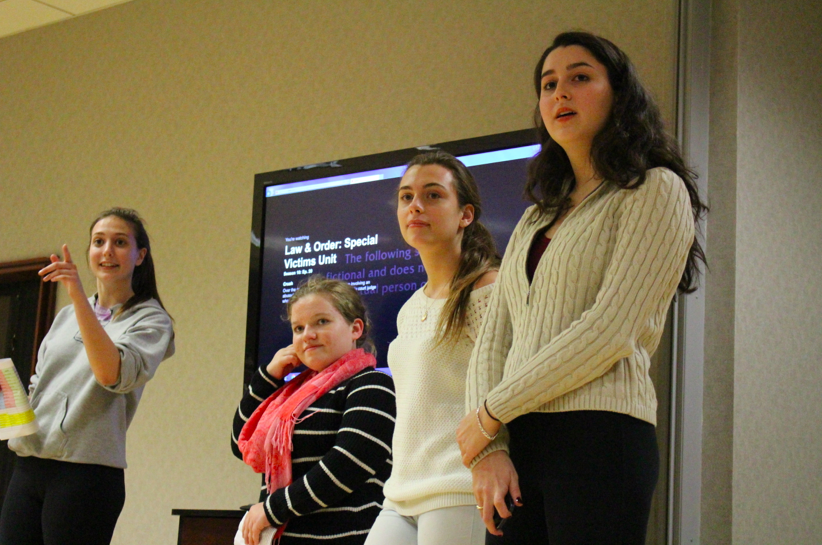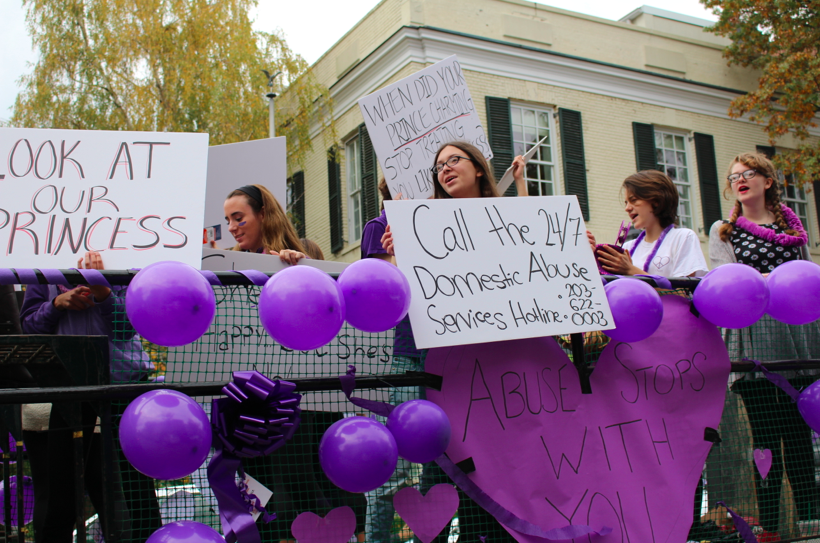Despite the weighty topic that YNet tackles, the students from GHS who partner with the Domestic Abuse Services at the YWCA to educate against teen dating violence are one of the biggest clubs at GHS.
Even better, YNet’s membership is comprised of both boys and girls.
Greenwich Free Press sat down with Isabelle Madoff, Maggie Keatinge, Oliver Prose and Santi MacLean at the YWCA, where the group holds many of their meetings.
Keatinge said the club has benefited from a huge membership increase this year. Last year between 10-20 teens turned out for meetings. This year the number is a solid 30-40 people.The interest in YNet has been so strong that the group implemented an application process.
“We had a questionnaire. We wanted to see if people actually cared enough to join the club,” MacLean said.
“Teen dating violence and gender issues are so important, not just in high school, but on college campuses. All around, this issue is heating up. People are definitely interested in the topic more than ever.” – Isabelle Madoff, YNet, GHS ’15
“The more people who join the club, the more demographics you can hit throughout GHS,” said Oliver Prose. “And the more people you can educate about the problem, especially kids in high school who are going off to college and need to know how to protect themselves.”
 Santi MacLean said that when he suggests to friends at GHS that they join YNet he has to demystify the club’s mission.
Santi MacLean said that when he suggests to friends at GHS that they join YNet he has to demystify the club’s mission.
“They’ll say, ‘Oh, I’ve never been in an abusive relationship,’ or, ‘I’m not in a relationship, so it doesn’t really apply to me,'” MacLean said. “But one in three people will be in an abuse relationship in their lives, so it’s not specific to any particular group.”
New members each participate in a 90 minute orientation. Keatinge explained that that entails. “We go over all the ways people can get sucked into an abusive relationship. In the fall we offered four different sessions and people chose which to attend,” she said, adding that the orientations were ald at GHS.
“We talk about how you don’t have to be dumb at all to get into one of these relationships. You can know about it, and know the signs, but even if you do, everyone is still at risk for it,” Keatinge said.
MacLean explained the corollary to good people in bad relationships. “If you have a friend in an abusive relationship, we learn to never let them think that it is their fault.”
Blaming the Victim
“We were talking about Ray Rice and how his fiancée stood by him, and why,” said Prose. “We learned about all the factors that go into that decision. People have been saying, “Oh, she’s so stupid and if she lets him hit her, she’s so stupid,” Prose said, referring to a conversation in his wellness class at GHS. “That’s why YNET is so important. People don’t really know. They’re just not aware.”
“She could still love him even though he did this,” Keatinge said of Janay Palmer. Palmer is now married to Ray Rice who was captured on video inside an elevator knocking his then fiancée out cold.
“We always tell our members that people in abusive relationships are ten times more likely to develop alcohol and substance abuse problems, so we discuss that a lot,” Keatinge said. “We talk about how people say, ‘She was drunk, so that’s why a sexual assault happened. But our focus is on how it’s never the victim’s fault.”
Madoff reflected on a recent visit from Maggie’s Mission, an interactive program that teaches young people how to be proactive and avoid being a victim, especially of abduction.
“We talk a lot about college and how your risk goes up a lot when you’re on a campus. When Maggie’s Mission came to talk to us two weeks ago, she talked about staying safe on a campus.”
“We asked her for college related tips, and she said always walk home with someone else. Never walk home alone this one time, always stay on the safer side,” Prose said.
“It’s very real how many times girls get sexually assaulted on college campuses, by college students or strangers. It’s very real.” Oliver Prose, YNet, GHS ’15
Keatinge said the group had sponsored parent nights for GHS and non-GHS parents, and talks were geared teen dating violence, but, she said they found it challenging to get a turnout.
“It’s important for parents to know about. The issue thrives off of silence. But, it’s sort of a taboo topic to talk to your kids about,” said Prose.

Subscribe to the daily Greenwich Free Press newsletter.
A healthy relationship is learned behavior.
“It’s not only about teaching them the signs of an abusive relationship, but also kids need to be taught at a young age what is a healthy relationship,” MacLean said.

The YNet group had a float in the GHS Homecoming Parade. Credit: Leslie Yager
“We interviewed Yajaira, about abusive relationships for our senior wellness project,” MacLean said referring to Yajaira Gonzalez who is a Domestic Abuse Services counselor at the YWCA. “And she talked about how the biggest way to prevent them from happening is through awareness from a young age. So you know what kind of a relationship you’re supposed to be building with people.”
“It seems that a lot of girls and guys don’t really know what an abusive relationship is. So when they find themselves in one, it’s not that they don’t want to do anything about it, it’s that they don’t realize that they are in an abusive relationship.” – Oliver Prose, GHS ’15
“The polar extreme of an abusive relationship is so bad that kids say, ‘That’ll never happen to me,'” MacLean pointed out, adding that how to have a healthy relationship is learned behavior.
What defines a healthy relationship?
Keating listed the five types of abuse: physical, verbal, emotional, sexual and financial and technological. She said that in a healthy relationship, those five behaviors are absent. She said, for example, that when one person in the relationship buys things for the other and makes them feel guilty afterward, that is financial abuse.
“In an abusive relationship, the balance of power and control is something we talk about a lot. If you’re in an abusive relationship, your abuser is going to want more power and control. So in a healthy relationship, that struggle and fight for control is non-existent. There’s more balance.” Isabelle Madoff, YNet, GHS ’15
“We tell people that if you’re ever scared in your relationship — scared to talk to the person, that’s a huge red flag,” Keatinge said. “That’s a major warning.”
“A lot of tactics used by abusers are isolation and intimidation,” said MacClean. “You should never feel intimidated by your partner and you should never feel they are the only person you have as a friend. If you’re comfortable with relationships with other people besides your partner, then you’re in a healthy relationship.”
“Just like a friendship or relationship with a family member, a healthy relationship is based off equality,” Prose said. “If one person has more power than the other, or one needs more power than the other, then it’s probably not a healthy relationship.”
Anyone interested in joining YNet should email either Yajaira Gonzalez at [email protected] or GHS club advisor Mary Belanger at [email protected]. In January there will be a registration, and all members will go through a 90 minute orientation.
- Check out YNet’s Facebook page, which is full of useful information.
- More information on YWCA’s Domestic Abuse Services is available online.
- The YWCA 24-hour DAS hotline is (203) 622-0003
- Fact sheet on Teen Dating Violence.

Email news tips to Greenwich Free Press editor [email protected]
Like us on Facebook
Twitter @GWCHFreePress
Subscribe to the daily Greenwich Free Press newsletter.